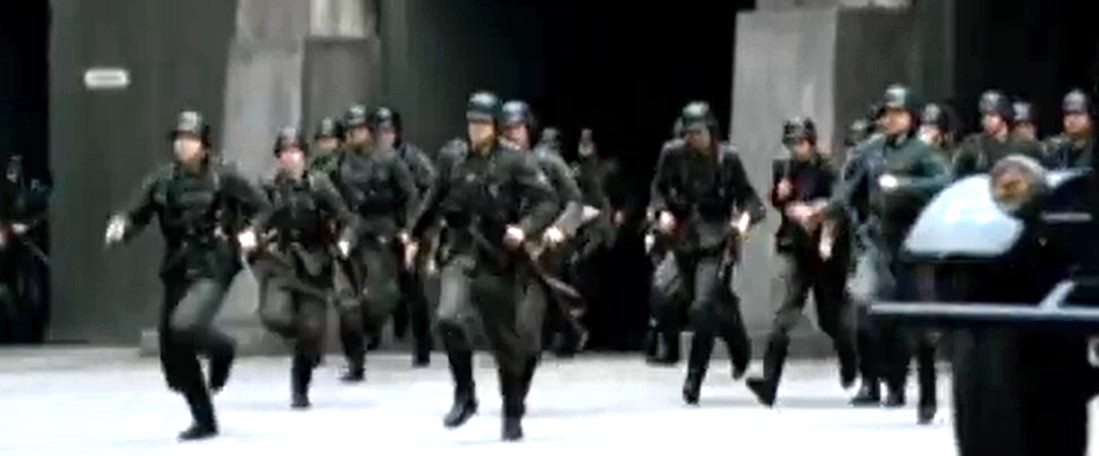By Andy Ford
Continuing our occasional series on the eightieth anniversary of important events of the Second World War, Andy Ford, looks at the failed attempted assassination of Adolf Hitler in July 1944. This article was written as an introduction to a longer article, published in Socialist Appeal, in August 1944, by Marxist theoretician, Ted Grant.
……………………….
On July 20 1944, Adolph Hitler narrowly survived an explosion at his East Prussian headquarters. The bomb had been planted by a highly-decorated colonel in the German Army, Claus von Stauffenberg, who was part of a network of dissident officers in the Wehrmacht and military intelligence.
Von Stauffenberg had intended to plant two bombs, but could only arm one because of his war injuries and the time he had available. As well as that, the meeting with Hitler which had been intended to take place in an underground concrete bunker – which would have intensified the blast – was instead moved, due to the hot weather, to a wood cabin, above ground and with windows.
Hitler survived to wreak a bloody vengeance
The final failure in the assassination plan was that, after Stauffenberg had left the meeting, a junior officer moved the briefcase that had been placed under the conference table, so that it now lay behind a solid oak table leg. As a result, the blast from the explosives hidden in the briefcase was deflected away from the Nazi dictator.
The outcome, therefore, was that Hitler survived, to wreak a bloody vengeance on all the Prussian officers who had organised, or at least tacitly tolerated, the plot. Around seven thousand suspects were rounded up, the majority of whom were executed. The same state of terror was instituted in the German armed forces and elite industrial circles, as had been visited on the German working class, “Hitler’s first victims”, from 1933 onwards.
Power was centralised in the SS and the Gestapo, as Hitler’s regime lost all traces of its previous base in the Prussian officer caste, the Church, and among the leaders of industrial trusts and cartels.
Ted Grant, even at that time a prominent British Trotskyist, wrote this article Germany: What Next? shortly after the assassination attempt became known outside Germany. It was written for the British Marxist newspaper Socialist Appeal.
Dissident officers were no democrats
In it, Ted pointed out the huge implications of a split in the German ruling class and the fact that in Trotsky’s words “Germany is not only Germany; it is the heart of Europe”. He described how military shocks like the huge German defeat in Russia of Operation Bagration (article here), which was unfolding just as the plotters bomb exploded, had affected the mass of the German population, and in turn affecting the elite, the Prussian officers.

But the dissident officers were no democrats, and at all costs they wished to avoid a repeat of the revolutionary events at the time of the collapse of Germany in the First World War, in 1918, with its “anarchy and undisciplined behaviour”. These officers aimed for a palace coup, to replace Hitler with a more amenable figure, just as the Italian ruling class had done by removing Mussolini the previous year.
But this refusal by the plotters to involve the masses, the working class, necessarily imposed severe limitations on the effectiveness of the plot, and made it ‘containable’ by the butchers and torturers of the SS and Gestapo.
Ted Grant also looked forward optimistically to “sparks of opposition” being fanned “into revolutionary flames” with factory committees and soviets being formed all over Germany, as happened at the end of the previous war. But this, as we know, did not happen; or at least not in the way that Ted and the Trotskyist movement expected.
Nazi repression right up to the end
The extreme nature of the Nazi repression, which was a symptom of the weakness, not the strength, of the regime, largely kept the lid on overt resistance right up until the end. Even as Russian troops were advancing to within a few miles of Berlin, the SS were still hanging Germans from lamp-posts for showing any sign of ‘defeatism’ or ‘cowardice’
Nonetheless, in 1945, as British and American troops advanced into Germany, they were often met in the working class districts by ‘Antifa Committees’ which had been formed spontaneously by the workers in the workplaces to protect their coal-mines and factories against ‘scorched earth’ destruction by the SS. Often they had arrested or chased out the local Nazis, going on to arrange policing, distribution of food and clothing, and helping bombed-out families find accommodation.
In Bremen, Leipzig and other towns these Antifa Committees had begun to link up, a process that was soon nipped in the bud by the occupying armies. As the Red Army front advanced from the east, the terror that their soldiers wreaked on the German population – the entire Stalinist war propaganda having been nakedly nationalist and anti-German rather than anti-Nazi – meant that the semi-uprisings that took place in the west did not take place in the east. On the contrary, the brutality and rapes perpetrated by the invading Red Army provoked desperate resistance and mass flight.
Disgusting anti-German chauvinism of the Stalinists
Ted Grant drew attention in his article to the disgusting anti-German chauvinism of the Stalinists, repeated by ‘Communists’ in Britain, which contained not a shred of the class analysis of Nazism. Instead, it simply blamed the whole German people for the crimes of Hitler and the Nazis and this approach simply prolonged the survival of the doomed Nazi regime.
In different ways all of the leaders of the Allied armies – British, French, American and the Red Army – would have been aware of the revolutionary ferment after the defeat of Germany in 1918 and would have done their best to stifle it. So in a slightly distorted way, the prognosis of the Trotskyists was borne out, at least in the west, but unfortunately, not to the extent that they had hoped. [A good account of the Antifa movement of 1945 is to be found in Capitalism Since World War II by Andrew Glynn and others, here].
The July 20 plot to assassinate Hitler has been dramatised in the Hollywood film Valkyrie, which glamorises the plotters and portrays them as the good democrats they never were. Nonetheless, in its general description of events, it gives a good account of the plot from the inside.
Ted Grant (1913 – 2006) was one of the foremost post-war Marxist theoreticians, and he has left an unmatched legacy in the British labour movement. All of his archive is worth reading and can be found here. The original article reviewed here, entitled Germany – What Next?, can be found in the archive here.
[Top picture is a still from the MGM film Valkyrie]



